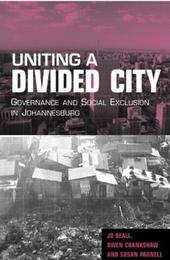
|
Uniting a Divided City: Governance and Social Exclusion in Johannesburg
Paperback
Main Details
| Title |
Uniting a Divided City: Governance and Social Exclusion in Johannesburg
|
| Authors and Contributors |
By (author) Jo Beall
|
|
By (author) Owen Crankshaw
|
|
By (author) Susan Parnell
|
| Physical Properties |
| Format:Paperback | | Pages:254 | | Dimensions(mm): Height 234,Width 156 |
|
| ISBN/Barcode |
9781853839160
|
| Classifications | Dewey:307.14160968221 |
|---|
| Audience | | Undergraduate | | Postgraduate, Research & Scholarly | | Professional & Vocational | |
|---|
| Illustrations |
Figures, tables, bibliography, index
|
|
Publishing Details |
| Publisher |
Taylor & Francis Ltd
|
| Imprint |
Earthscan Ltd
|
| Publication Date |
28 June 2002 |
| Publication Country |
United Kingdom
|
Description
For many, Johannesburg resembles the imagined spectre of the urban future. Global anxieties about catastrophic urban explosion, social fracture, environmental degradation, escalating crime and violence, and rampant consumerism alongside grinding poverty, are projected onto this city as a microcosm of things to come. Decision-makers in cities worldwide have attempted to balance harsh fiscal and administrative realities with growing demands for political, economic and social justice. This book investigates pragmatic approaches to urban economic development, service delivery, spatial restructuring, environmental sustainability and institutional reform in Johannesburg. It explores the conditions and processes that are determining the city's transformation into a cosmopolitan metropole and magnet for the continent.
Author Biography
Jo Beall is Reader in Development Studies at the London School of Economics. Owen Crankshaw is senior Lecturer in Sociology at the University of Cape Town. Susan Parnell is Associate Professor in Geography at the University of Cape Town.
Reviews"This book offers an analysis of Johannesburg between 1994 and 2000, a period of dramatic change. The authors contend that inclusiveness in government has been easier to achieve than economic redistribution or social equality. The carefully documented study supports their conclusion that social inequality prevails in the postapartheid era. A review of geography alone shows a city divided by social differentiation and exclusion along class, not race, lines, with a multiracial middle class, an employed working class, and the African unemployed and working poor. Gated communities, populated by both blacks and whites, bespeak a citizenry afraid of crime. Written by a sociologist, a geographer, and a development studies specialist, this effort represents excellent collaboration. Although the writing is dense, making the text somewhat difficult for nonspecialists, the many tables and figures greatly help to synthesize the data. Certain policies are seriously criticized based on in-depth neighborhood case studies. The authors successfully handle issues of deracialization, inequality within and between races, access to democracy, and decentralization. Anyone familiar with South Africa or interested in its recent history or an evaluation of development policies as enacted in Johannesburg should refer to this book. Summing Up: Recommended. Graduate students and faculty." -- R. Ellovich, North Carolina State Universityin CHOICE
|